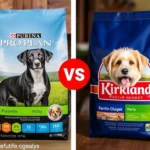
Introduction
When it comes to dog nutrition, pet owners often find themselves navigating a complex landscape of options. Proper nutrition is essential for our canine companions, affecting everything from their energy levels to their overall health and longevity. Among the various types of dog food available, dehydrated dog foods have gained popularity for their convenience and nutritional value. This article aims to guide you through the best dehydrated dog foods currently on the market, ensuring your furry friend receives the best possible diet.
Understanding Dog Nutrition
Nutritional Requirements for Dogs
Dogs have specific nutritional requirements that vary throughout their life stages. Essential nutrients include:
- Proteins: Crucial for muscle development and repair.
- Fats: Provide energy and support cell function.
- Carbohydrates: Serve as a source of energy and aid in digestion.
- Vitamins: Play a vital role in various bodily functions and immune response.
- Minerals: Important for bone health and metabolic processes.
Puppies require higher protein and fat levels for growth, while adult dogs need a balanced diet to maintain health. Senior dogs may benefit from diets lower in calories but enriched with joint-supporting nutrients.
The Role of Diet in Canine Health
The impact of diet on a dog’s overall health cannot be overstated. A balanced diet promotes a shiny coat, healthy skin, strong bones, and a robust immune system. Poor nutrition can lead to various health issues, including obesity, diabetes, and dental problems. Understanding the importance of a well-rounded diet is crucial for any dog owner.
What are Dehydrated Dog Foods?
Definition and Process of Dehydration
Dehydrated dog foods are made by removing moisture from the ingredients, which helps in preserving their nutritional value. The process involves cooking the ingredients and then using heat to eliminate water content. This method retains essential nutrients while allowing for long shelf life.
Advantages of Dehydrated Dog Foods
The benefits of choosing dehydrated dog foods are numerous:
- Convenience: They are lightweight and easy to store, making them ideal for travel.
- Nutritional Value: Dehydrated foods often contain high-quality ingredients and fewer preservatives compared to kibble or wet food.
- Ingredient Quality: Many brands focus on whole, recognizable ingredients, avoiding fillers and artificial additives.
When compared to kibble, dehydrated foods generally have a higher nutritional density. They provide an excellent alternative to wet foods, which can sometimes contain high water content without offering as much nutrition. Additionally, dehydrated foods can be a part of a raw diet, providing a balance of nutrients without the mess.
Key Factors to Consider When Choosing Dehydrated Dog Foods
Ingredient Quality
The primary factor in selecting the best dehydrated dog foods is the quality of the ingredients. Whole foods should be prioritized, and it’s essential to avoid products containing fillers, artificial colors, or preservatives.
Nutritional Balance
Look for products that offer a complete and balanced diet. This means they should meet the nutritional standards set by the Association of American Feed Control Officials (AAFCO). Additionally, consider your dog’s life stage. Specialized formulas exist for puppies, adults, and seniors, catering to their unique nutritional needs.
Brand Reputation
Researching brands is vital. Look for companies with a good track record of safety and transparency. It’s also wise to check for any recalls and understand where and how their ingredients are sourced.
Top 10 Best Dehydrated Dog Foods
Brand 1: The Honest Kitchen
- Overview: The Honest Kitchen offers a variety of dehydrated dog foods made from organic ingredients.
- Ingredients: Whole grains, free-range chicken, fruits, and vegetables.
- Unique Features: Human-grade quality and a commitment to sustainability.
- Pros: High-quality ingredients, easy to prepare.
- Cons: Higher price range.
Brand 2: Stella & Chewy’s
- Overview: Known for their freeze-dried raw meals, Stella & Chewy’s also offers dehydrated options.
- Ingredients: Raw, cage-free poultry and organic fruits and vegetables.
- Unique Features: Focus on raw feeding principles.
- Pros: Nutrient-rich, promotes healthy coats.
- Cons: Can be pricey.
Brand 3: Primal Pet Foods
- Overview: Primal specializes in raw and dehydrated pet foods.
- Ingredients: Grass-fed meat, organic produce, and unrefined minerals.
- Unique Features: Focus on high-quality, raw ingredients.
- Pros: Excellent nutrient profile, various protein options.
- Cons: Requires rehydration, which can be time-consuming.
Brand 4: The Wildest
- Overview: Offers a range of unique protein sources for dogs.
- Ingredients: Wild-caught salmon, grass-fed beef, and organic vegetables.
- Unique Features: Focus on wild-sourced protein.
- Pros: Great for dogs with food sensitivities.
- Cons: Limited availability in some regions.
Brand 5: Grandma Lucy’s
- Overview: A family-owned brand offering a variety of dehydrated dog foods.
- Ingredients: Whole grains, meats, and organic vegetables.
- Unique Features: Focus on human-grade ingredients.
- Pros: Variety of flavors and protein sources.
- Cons: Some dogs may require an adjustment period.
Brand 6: Just Food for Dogs
- Overview: Known for their fresh food, they also offer dehydrated meals.
- Ingredients: Fresh proteins and vegetables.
- Unique Features: Recipes developed by veterinary nutritionists.
- Pros: Balanced nutrition, high-quality ingredients.
- Cons: Limited flavors.
Brand 7: Simply Nourish
- Overview: Offers a range of affordable dehydrated dog foods.
- Ingredients: Real meat, whole grains, and vegetables.
- Unique Features: Affordable without compromising quality.
- Pros: Good value for money.
- Cons: May not have as many unique flavors.
Brand 8: Nature’s Logic
- Overview: Emphasizes whole food ingredients and natural nutrition.
- Ingredients: Whole meats, vegetables, and fruits.
- Unique Features: No synthetic vitamins or minerals.
- Pros: High-quality, natural ingredients.
- Cons: Limited availability in stores.
Brand 9: NorthWest Naturals
- Overview: Specializes in freeze-dried and dehydrated dog foods.
- Ingredients: Raw, natural proteins and fresh produce.
- Unique Features: Focus on raw feeding.
- Pros: Nutrient-dense options.
- Cons: Higher price point.
Brand 10: PureBites
- Overview: Offers simple, high-quality dehydrated treats and meals.
- Ingredients: Single protein sources and minimal additives.
- Unique Features: Great for picky eaters.
- Pros: Simple and easy to digest.
- Cons: Limited meal options.
Transitioning Your Dog to Dehydrated Foods
Understanding the Transition Process
Altering your dog’s diet can be a delicate process. Gradual changes are essential to prevent digestive upset. Start by mixing a small amount of dehydrated food with their current diet.
Tips for Successful Transition
- Mixing: Begin with a 25% dehydrated food to 75% current food ratio, gradually increasing the dehydrated portion.
- Monitor: Keep an eye on your dog’s digestion and overall health during the transition. Signs of digestive upset can include vomiting, diarrhea, or reluctance to eat.
Frequently Asked Questions (FAQs)
What are the benefits of dehydrated dog food over kibble?
Dehydrated dog foods often offer higher nutritional density and higher quality ingredients compared to kibble. They are also free from many artificial preservatives and fillers found in traditional dog foods.
How do I prepare dehydrated dog food?
Preparing dehydrated dog food typically involves mixing the food with warm water and letting it rehydrate for a specified time. Always follow the manufacturer’s instructions for best results.
Can all dogs eat dehydrated food?
Most dogs can eat dehydrated food, but it’s essential to consider any specific dietary restrictions or allergies your dog may have. Consulting with a veterinarian is advisable if you have concerns.
How does dehydrated food compare in cost to other types?
While the upfront cost of dehydrated dog foods may be higher than kibble, they often provide better nutritional value, meaning you may feed less overall. It’s essential to weigh the long-term benefits against initial expenses.
Conclusion
Choosing the right dehydrated dog food is vital for maintaining your dog’s health and well-being. By considering your dog’s specific nutritional needs, ingredient quality, and brand reputation, you can ensure that your furry friend receives the best possible diet. Remember, a balanced diet is a cornerstone of good health, so take the time to explore the options available to you. With the right nutrition, your dog can live a longer, happier life.









